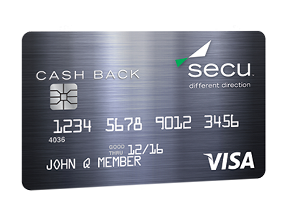SECU Credit Card Review: Excellent for Balance Transfers
SECU Credit Card


The State Employees’ Credit Union (SECU) Credit Card is a superb deal for cardholders who like to carry a balance.
Its APR is under 10%, making it a great deal for these cardholders (especially considering that the average credit card APR recently hit a record high of 16.92%). However, you’ll need to be a member of the State Employees’ Credit Union to get the card.If you’re not, you’ll have to explore some alternatives that offer special rates for balance transfers.
SECU Credit Card Review
Here’s what you absolutely must know about the SECU Credit Card.
- Qualifying Requirements:
- Member of SECU (which means meeting these membership eligibility requirements) or a close relative of a SECU member
- Resident of North Carolina, South Carolina, Georgia, Tennessee or Virginia
- Annual Fee: None
- APR: 9.50%
- Benefits:
- No balance transfer fees
- No cash advance fees
- Can be used for overdraft protection on your SECU checking account
- Cardholders can add a photo to their card to help prevent fraud
- Minimum Payment: 3% of your total balance or $25, whichever is greater
- Other Fees:
- $5 late payment fee
- $5 returned payment fee
- $0.75 ATM transaction fee
- 0.8% foreign transaction fee (1% if conducted in two different currencies)
Why to Apply for the SECU Credit Card
You might want to get an SECU Credit Card in the following circumstances:
- You like to carry a balance: You’d be hard-pressed to find a card with a lower APR than 9.50%, so if you tend to carry a balance on your credit cards, using this one will save you a lot of money over time.
- You use cash advances: The SECU Credit Card has a zero cash advance fee, and the APR on cash advances is also 9.50%. That’s a terrific deal, especially for someone who takes cash advances a lot.
SECU Credit Card: Drawbacks and Downsides
You should also take these issues into account before signing up for the SECU Credit Card.
- There’s no 0% introductory balance transfer rate: Several credit cards offer a short 0% APR balance transfer period for new cardholders, but the SECU Credit Card does not have one of these. Not having a balance transfer fee helps, but you will always have to pay something for your balance transfers.
- You can’t earn rewards: Credit card rewards have become the norm, but the SECU Visa Credit Card has neither cash rewards nor a point system. If you’re interested in these, you’re better off going with a more traditional rewards credit card.
SECU Credit Card Alternatives
If you’re interested in a card that offers equivalent benefits but fewer restrictions, try one of these.
If you’re looking for a balance transfer card,try the Chase Slate Card. The card has a 0% introductory APR (for the first 15 months) and a $0 balance transfer fee on transfers during the first 60 days after approval. Once the introductory rate expires, the card’s APR ranges from 16.49% to 25.24%.
Find the right card that fits your lifestyle.

SECU Credit Card
Get your free Crunch ScoreIf you’re looking for a low APR, try the Capital One VentureOne Rewards Credit Card. You’ll get a 0% introductory rate for the first 12 months, and the card’s regular APR can be as low as 13.74% (for cardholders with excellent credit). Plus, you’ll earn airline miles on every purchase and there’s no annual fee.
Bottom Line: Should You Apply for the SECU Credit Card?
If you happen to qualify for SECU membership, then the SECU Credit Card can be an excellent choice especially if you tend to carry a balance from month to month. On the other hand, someone who pays their card off every month would be better off with a rewards card to earn rewards on day-to-day purchases.



